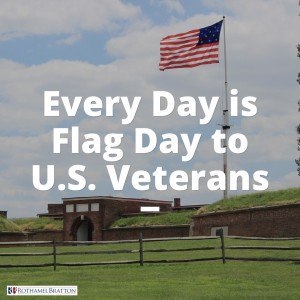This year, June 14th marks the 100-year anniversary of the establishment of Flag Day in the United States. Though it is not a federal holiday, it is an annual tradition and celebration that marks the adoption of our country’s flag on the anniversary of the date that it was made official back in 1777. The stars and stripes of Old Glory have remarkable meaning and power, and carry tremendous emotional weight and significance. Images of our flag being raised – or lowered to half-mast – often evoke tears, pride, and joy.

The U.S. flag waves in front of schools and government buildings, in spaces both public and private, and even on the moon, but perhaps none of the places where it is seen is so evocative as when a burial flag is presented at a Veteran’s funeral. It is something that is never forgotten once seen. The tradition of providing these flags to deceased Veterans has been a tradition since 1962, and it is often one of the most moving parts of a Veteran’s memorial service, but few realize the meticulous level of attention that goes in to the presentation of these flags, or how often this service is provided. It has been estimated that the Department of Veterans’ Affairs distributes over 600,000 burial flags each and every year.
Each flag that is presented at a Veteran burial is required to have been manufactured in the U.S. and must meet specific size and material requirements, as well as requirements for how it is constructed and assembled. The detail is a reflection of the gratitude that the country feels for its Veterans sacrifices and service. The presentation of the flag is performed by an honor guard detail consisting of no less than two members of the Armed Forces, with one representing the service in which the Veteran served. The honor guard folds and presents the flag to the Veteran’s survivors while Taps is played. When attendance at a burial service is not possible, the flag is mailed to survivors, wherever they are in the world.
When a burial flag is presented to the survivors of a U.S. military Veteran, it is one of the many benefits that their service entitles them to. Others may include financial assistance in the form of supplemental income, disability compensation, dependency and indemnity compensation, and special monthly compensation for those who have been diagnosed with specific disabilities or under special circumstances. The attorneys at Rothamel Bratton can help ensure you get the benefits you deserve. We will review your case and determine the best way to move forward in an effort to get you approved for the VA benefits you earned.
